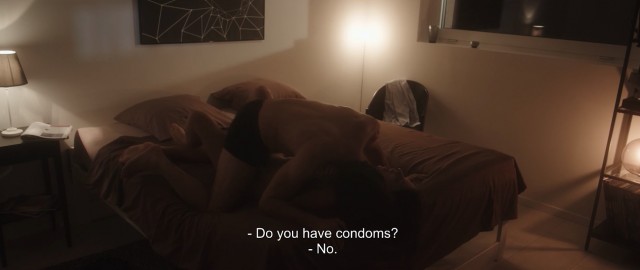Based around a situation that most have experienced, or at the very least can relate to, Anne Thorens’ five-minute short Diagonale (Diagonal) depicts a passionate night between a young couple, which gets derailed when neither has a condom. One could argue that this premise has already been depicted many times, but writer/director Thorens infuses her film with so much authenticity, exposing the depth of the situation with great sensitivity and subtlety, that it might feel uncomfortably real for some.
“This film is not an answer, it’s made like a question”
You don’t need to look far to get an idea of where Diagonale’s narrative came from. Feeling strong pressure from a partner, and not being listened to, is unfortunately not that uncommon. However, it was the different perceptions of the event, from both parties, that planted the seed for this film. Having experienced a similar situation herself, which stayed with her long after, Thorens was then confronted with the fact that her partner had a different recollection of the night. Even being told that she should have been clearer when saying no.
And that is the infuriating part of the situation – the trauma is not acknowledged. As a woman, I found the film incredibly effective and genuine, but having spoken to the male members of the S/W team, it seems like Thorens’ lens made her female character’s emotional experience impactful for them as well (describing the ending as “really hitting you in a dark place”). The power of the female gaze!

A common question leads to a line being crossed in Anne Thorens’ short film Diagonale
Thorens shapes her film in a way that lets the audience process the events as the night unfolds, without ever being judgemental. “This film is not an answer, it’s made like a question”, she tells us while explaining how she wanted to tackle the power dynamic between a woman and a man in this situation. The authenticity in her screenplay is clear, the subtlety and nuances of the situation are all there in the dialogue and the pacing. A line gets crossed but when the film ends, we can’t really pinpoint the exact moment its breached, and arguably everyone could have a different idea of when it happens.
By shooting the film as a single take, in the one location, the audience is never allowed a break from the escalating and insidious atmosphere. While the tension between the two characters gets more and more palpable, the nuances of the situation only confront us with her trauma when it is already too late. The tightening of the frame contributes to that atmosphere, making us feel suffocated by his pressure and his refusal to listen. As the camera settles on the female character’s face for the conclusion of the short, it makes for an impressive and emotionally powerful gut-punch, instantly provoking you to quickly question all that came before – exactly as the director intended.

Leonor Oberson and Cyprien Colombo play the short’s passionate couple with startling authenticity.
While Thorens’ approach sets the film for success, its effectiveness also relies heavily on the performances of the two lead actors (Leonor Oberson and Cyprien Colombo) and the authenticity of the chemistry between them. Thorens explains that the rehearsal process was vital in allowing the pair to find their bearings and get comfortable with one another, especially with the one-shot approach to the shoot.
While some marks needed to be hit because of the way the film was shot, both were given a certain degree of freedom in their movement. Undeniably the result is extremely compelling. While Colombo plays the oblivious boyfriend extremely convincingly, it is Oberson’s genuine sensitivity that steals the scene, making the film crawl under your skin and leaving a permanent mark on your retina – the expression and realisation on her face in that last moment feels like something you’ll never forget.
Though Diagonal is Thorens’ directorial debut, she has already completed a second short film, Rocks and Crows, which deals with trivialized violence. Next up, she hopes to start shooting her third short Elsewhere in the summer, while also writing a feature film about an encounter between two very distinct social classes.

 Céline Roustan
Céline Roustan